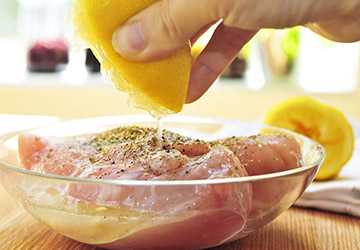How to Marinate Meats for Maximum Flavor in Minimum Time
There's an unparalleled joy in relishing a piece of meat that's been marinated just right. A well-marinated dish's juicy, full of flavor and melt-in-your-mouth tenderness can elevate even the most essential meal into a gastronomic work of art. While marinating meat is often time-consuming, it doesn't have to be.
In this article, we will journey into the artistry of marinating meats, aiming for the most decadent flavor in the shortest possible time. This way, you can savor dishes that rival those served in high-end restaurants, all from the comfort and convenience of your kitchen.

The Magic of Marination
Before we delve into the tricks and tips for marinating meats quickly, let's first understand why marination is so essential in cooking. Marination is soaking meat in various ingredients to enhance its flavor, tenderness, and juiciness. It serves multiple purposes:
Flavor Enhancement: Marinating infuses the meat with various flavors, from herbs and spices to acids and fats. This can transform even the most basic cuts into mouthwatering delights.
Tenderization: The acids and enzymes in the marinade help break down the muscle fibers in the meat, making it more tender and accessible to chew.
Moisture Retention: Marinating meat enhances its flavor and ensures it stays juicy during cooking, preventing it from drying.
Now that we understand the importance of marination, let's get to the juicy part – how to quickly marinate meats for maximum flavor.
Choose the Right Cut of Meat
The first step to a quick and flavorful marination is choosing the proper cut of meat. Some cuts are naturally more tender and can be marinated for a shorter duration without sacrificing flavor. Opt for cuts like ribeye, sirloin, and tenderloin, which are inherently delicate and require less marination time. Stricter cuts like chuck or round steak may need longer marination to achieve the desired tenderness.
Go for Thin Slices
If you're in a hurry but still want to enjoy the benefits of marination, consider slicing your meat thinly. Thin slices cook faster and absorb the marinade more quickly, allowing you to achieve maximum flavor in a shorter time frame. This is particularly effective for dishes like stir-fries or fajitas.
Use Acidic Ingredients
Acidic ingredients, like citrus juices (lemon, lime, or orange) or vinegar, can expedite the marinating process. The acid helps to tenderize the meat by breaking down the muscle fibers. You can achieve fantastic results in 30 minutes to 2 hours with acidic marinades. Just be careful not to over-marinate with strong acids, as they can start to "cook" the meat if left for too long.
Prioritize Flavorful Ingredients
When you're short on time, you must make every minute count. Using bold, flavorful ingredients in your marinade can give you the most bang for your buck. Ingredients like garlic, ginger, fresh herbs, and spices pack a punch and quickly infuse your meat with delicious flavors.
Embrace the Power of Oil
Adding oil to your marinade not only helps distribute the flavors but also aids in the absorption of marinade by the meat. It carries the herbs and spices, ensuring they adhere to the meat's surface. Furthermore, the oil helps create a delicious crust on the meat when it's cooked, enhancing the overall texture and flavor.

Don't Forget Salt
Salt is an essential ingredient in any marinade. It enhances the flavor and helps season the meat, drawing out its natural juices and making it more tender. Be sure to add salt to your marinade, but avoid using too much, as it can be overpowering.
Marinating Times
For those moments when you need to whip up a quick and tasty meal, it's essential to know how long to marinate your meat. Here's a rough guide:
Thin Slices (e.g., chicken breast, fish): 15 minutes to 1 hour.
Poultry (e.g., chicken thighs, drumsticks): 2 to 4 hours.
Pork and Lamb: 2 to 4 hours.
Beef (depending on the cut): 2 to 12 hours.
Remember that marinating for longer doesn't necessarily mean better flavor. Over-marinating can sometimes result in a too-strong flavor or mushy texture, so finding the right balance is essential.
Temperature Matters
Another vital aspect of marinating is ensuring the meat is stored at the right temperature. Keep your marinating meat in the refrigerator, as temperatures above 40°F (4°C) can promote the growth of harmful bacteria. Also, don't forget to cover the meat to prevent it from drying out or absorbing any other odors in the fridge.
Experiment with Different Combinations
The beauty of marination lies in its versatility. Feel free to experiment with different combinations of ingredients to discover unique flavor profiles. The possibilities are endless, whether you're in the mood for a zesty citrus marinade or a savory blend of herbs and spices. The key is to find a balance that suits your taste and the type of meat you're preparing.
Try Quick Marinades
If you're genuinely pressed for time, consider using quick marinades. These concentrated flavor pastes or liquids can instantly infuse your meat with flavor. You can find a variety of ready-made marinades in your local grocery store, or you can create your own by blending a few key ingredients.
Use a Vacuum Sealer
A vacuum sealer can be a game-changer for those serious about marinating quickly. These machines remove the air from the marinating container, allowing the marinade to penetrate the meat more effectively. The result is a quicker and more thorough marination process.
Conclusion
In the world of culinary delights, marinating meat is an art that can be mastered even in a hurry. While traditional marination methods are fantastic, it's good to know that you can achieve maximum flavor in minimum time with the proper techniques and ingredients. The critical takeaway is to choose the appropriate cut of meat, slice it thinly if possible, use flavorful ingredients, and remember the power of acidic elements and oil.


